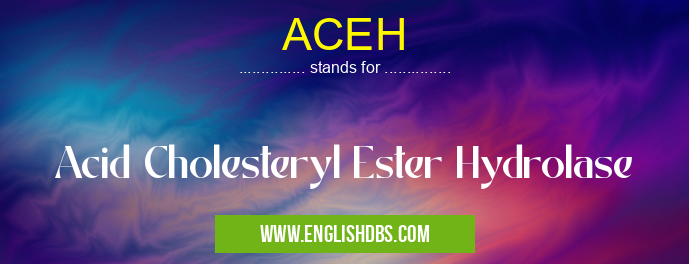What does ACEH mean in CHEMISTRY
Acid Cholesteryl Ester Hydrolase (ACEH) is an essential enzyme involved in lipid metabolism. It plays a crucial role in the hydrolysis of cholesteryl esters, which are stored forms of cholesterol. ACEH activity is particularly important in tissues with high cholesterol turnover, such as the liver, adrenal glands, and reproductive organs.

ACEH meaning in Chemistry in Academic & Science
ACEH mostly used in an acronym Chemistry in Category Academic & Science that means Acid Cholesteryl Ester Hydrolase
Shorthand: ACEH,
Full Form: Acid Cholesteryl Ester Hydrolase
For more information of "Acid Cholesteryl Ester Hydrolase", see the section below.
Functions of ACEH
ACEH catalyzes the hydrolysis of cholesteryl esters to release free cholesterol and fatty acids. This process is essential for the following functions:
- Cholesterol homeostasis: Regulation of cholesterol levels within cells.
- Cell membrane composition: Maintenance of the proper balance of cholesterol in cell membranes.
- Hormone synthesis: Production of steroid hormones in the adrenal glands and reproductive organs.
Regulation of ACEH
The activity of ACEH is tightly regulated to ensure balanced cholesterol metabolism. Factors that influence ACEH regulation include:
- Hormonal control: Hormones such as insulin and glucagon can modulate ACEH activity.
- Lipid levels: High levels of cholesteryl esters can stimulate ACEH activity.
- Genetic factors: Mutations in the ACEH gene can affect its function and contribute to cholesterol disorders.
Clinical Significance
Dysregulation of ACEH activity can lead to various health conditions:
- Cholesterol disorders: ACEH deficiency can cause accumulation of cholesteryl esters, leading to conditions like Wolman disease and cholesteryl ester storage disease.
- Adrenal insufficiency: Impaired ACEH activity can disrupt steroid hormone synthesis in the adrenal glands, resulting in adrenal insufficiency.
- Cardiovascular disease: ACEH has been implicated in the development of atherosclerosis, a condition characterized by plaque formation in arteries.
Essential Questions and Answers on Acid Cholesteryl Ester Hydrolase in "SCIENCE»CHEMISTRY"
What is ACEH?
Acid Cholesteryl Ester Hydrolase (ACEH) is an enzyme responsible for hydrolyzing cholesteryl esters, releasing cholesterol from them. It plays a crucial role in cholesterol homeostasis and metabolism.
Where is ACEH found?
ACEH is primarily found in lysosomes, which are organelles involved in cellular digestion and recycling. It can also be found in other cellular compartments, such as the endoplasmic reticulum and the plasma membrane.
What is the role of ACEH in cholesterol metabolism?
ACEH hydrolyzes cholesteryl esters, liberating free cholesterol. This free cholesterol can be used for various cellular functions, including membrane synthesis, hormone production, and bile acid synthesis.
What happens when ACEH activity is impaired?
Impaired ACEH activity can lead to the accumulation of cholesteryl esters in cells, a condition known as cholesteryl ester storage disease (CESD). CESD can cause a variety of health problems, including liver damage, gastrointestinal issues, and neurological disorders.
Can ACEH deficiency be treated?
There is currently no cure for ACEH deficiency, but treatments focus on managing the symptoms and preventing complications. These treatments may include dietary modifications, enzyme replacement therapy, and medications to lower cholesterol levels.
Final Words: ACEH is a key enzyme in lipid metabolism, responsible for the hydrolysis of cholesteryl esters. Its activity is vital for cholesterol homeostasis, cell membrane composition, and hormone synthesis. Dysregulation of ACEH can contribute to cholesterol disorders, adrenal insufficiency, and cardiovascular disease. Understanding the functions and regulation of ACEH is crucial for advancing research and developing therapeutic strategies related to these conditions.
